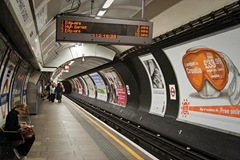 Economist Bridget Rosewell outlines the strategic importance of infrastructure to Peter Cheney and points out how flexible thinking for the long term has delivered economic growth.
Economist Bridget Rosewell outlines the strategic importance of infrastructure to Peter Cheney and points out how flexible thinking for the long term has delivered economic growth.
The crucial importance of infrastructure (and investment into it) is perhaps best understood in its absence, Bridget Rosewell contends.
“Infrastructure matters because it’s the skeleton of any economy,” she tells agendaNi. “If you think about an economy without infrastructure, essentially you’re talking about self-sufficient peasant agriculture so as we move up into modern economies, they require more and more infrastructure.”
A founding partner of the economic consultancy Volterra, Bridget Rosewell was the Greater London Authority’s Chief Economist between 2002 and 2008. Elaborating, Rosewell outlines three key ‘building blocks’ which double up as reasons for why infrastructure is essential:
• a transport system to get goods to market and people to jobs;
• energy distribution; and
• the underpinning ‘institutional infrastructure’ i.e. the rule of law and how people in society engage with one another.
The World Economic Forum’s Global Competitiveness Report, though, ranks the UK’s overall infrastructure as 28th in the world; Switzerland comes first. National infrastructural spending stands at 1.5 per cent of GDP, compared to 6 per cent in Japan and around £500 billion of investment is needed over the next decade to close the gap.
“Like many problems in the UK, actually, it was all about complacency,” she says of the deficit’s cause. “After the rebuilding of the economy after the Second World War, people thought they’d done the job and we were a mature economy [with] stable growth. We had enough infrastructure and everything that we did add to it just made life a bit better for people but wasn’t really about supporting the economy.”
The last decade has seen a slow realisation that infrastructure has to keep up with an economy that is not standing still. While policy-makers had thought seriously about the UK’s future economic needs after the oil price spike in the early 1970s, the importance of infrastructure was not grasped at that point. That said, a railway system dating from the 19th century would soon help to drive up the capital’s rising prosperity.
“London lost a million jobs in manufacturing and replaced that with more than a million jobs in services without really fixing anything on the infrastructure [side].” She adds: “Basically there was just enough space in that existing infrastructure to make that sort of shift possible.”
Belfast and other regional cities, though, have struggled to make that transition as they have lacked that underpinning infrastructure. “That’s why you need to make that re-investment and change what you’ve got,” Rosewell emphasises.
Planning for this development, by its nature, requires an eye on the long term but she cautions against the post-war tendency to have the “the right level of infrastructure”. The process is “not so much about long-term planning” but more about long-term “optioneering”. Rosewell explains: “We need that spare capacity so that it gives you flexibility. It’s more about enabling you to work with options, I think, than it is saying: ‘We’ve got a plan.’”
 It is still important to develop a strategic vision. The 1943 motorway map for Great Britain has largely stood the test of time, with its implementation on the ground adjusted as attitudes and the economy have changed.
It is still important to develop a strategic vision. The 1943 motorway map for Great Britain has largely stood the test of time, with its implementation on the ground adjusted as attitudes and the economy have changed.
As Chief Engineer for London’s Metropolitan Board of Works, Joseph Bazalgette had a vision for growth and built sewers for the city with four times the capacity in the 1850s and 1860s. “The engineers told him: ‘This is what we need’ but he said: ‘We’re going to grow and we’ll double that, and we’ll double that again.’” That capacity is only being reached now.
To use another example, the railway pioneers put in place competing lines to cities, which are now “pretty useful” when one line breaks down or needs to be closed due to maintenance work.
Rail and aviation are two of her main interests; Rosewell is a non-executive Director of Network Rail and a strong supporter of airport expansion.
“One of the things that really matters to all parts of the UK is market access,” she points out. “We’ve got to be able to reach the growing markets in the rest of the world and although Europe is important, we really can’t rely on being on the edge of Europe.” Put simply, inward investors are “not going to invest here if they’re not going to get here.”
When the projected increase in aviation emissions is put to her, Rosewell contends that the trading of emissions would be an important aspect of expansion with technological change and investment making savings elsewhere.
“Cracking the battery problem would make a major contribution to transmission losses, for example,” she remarks. Plugging solar panels directly into batteries rather than the grid could deliver major changes and the emissions savings could then be traded over to the aviation sector: “As much as anything,” she remarks, “it’s about effective use of emissions rather than just saying: ‘We’ve got to get everything down.’”
Railways drive ‘effective growth’
Poor rail links between Ireland’s cities will hold back economic growth, Rosewell warns, as she highlights the potential benefits of high-speed rail. Limited frequency on the Belfast-Dublin line is the most obvious example (a two hour 15 minute journey, leaving eight times a day) but, better connections to Limerick, Cork and Derry are also needed: “One of the ways to increase the economic effectiveness of the island is to increase the linkages between those cities.”
“Railway technology is possibly the United Kingdom’s greatest legacy to the world,” she states. “It’s hugely important, not just for how we created our economy but actually how that’s [been] created across the whole of the world, and the re-investment into high-speed rail is one of the ways in which we can improve that.”





